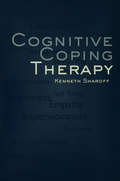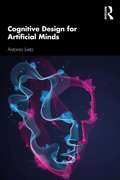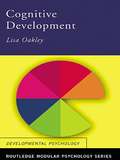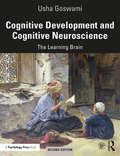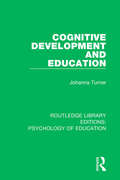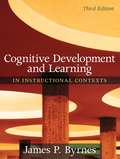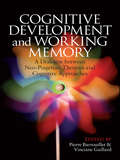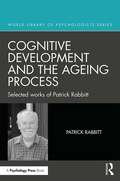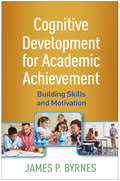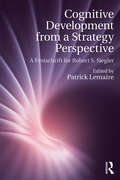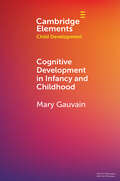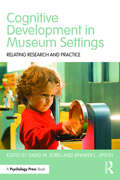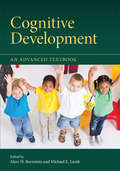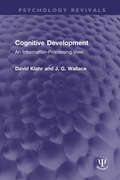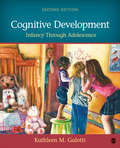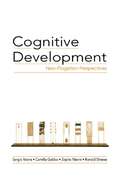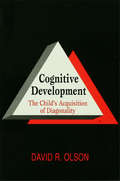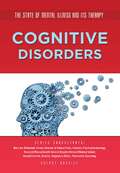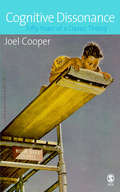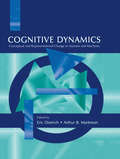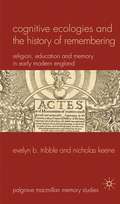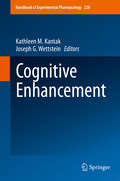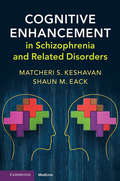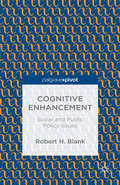- Table View
- List View
Cognitive Coping Therapy
by Kenneth SharoffCognitive Coping Therapy partners coping skills therapy and cognitive behavior therapy. It offers cognitive coping therapy, which essentially develops coping skills therapy, into a comprehensive model of care. It presents a practiced theory and underlying philosophy for the approach, along with methodology and guidelines for implementing it. It refines and further extends cognitive behavioral practice theory and, in doing so, offers case studies to illustrate how to use the model with a variety of disorders. A new coping skills slant for treating a variety of disorders.
Cognitive Design for Artificial Minds
by Antonio LietoCognitive Design for Artificial Minds explains the crucial role that human cognition research plays in the design and realization of artificial intelligence systems, illustrating the steps necessary for the design of artificial models of cognition. It bridges the gap between the theoretical, experimental and technological issues addressed in the context of AI of cognitive inspiration and computational cognitive science. Beginning with an overview of the historical, methodological and technical issues in the field of Cognitively-Inspired Artificial Intelligence, Lieto illustrates how the cognitive design approach has an important role to play in the development of intelligent AI technologies and plausible computational models of cognition. Introducing a unique perspective that draws upon Cybernetics and early AI principles, Lieto emphasizes the need for an equivalence between cognitive processes and implemented AI procedures, in order to realise biologically and cognitively inspired artificial minds. He also introduces the Minimal Cognitive Grid, a pragmatic method to rank the different degrees of biologically and cognitive accuracy of artificial systems in order project and predict their explanatory power with respect to the natural systems taken as source of inspiration. Providing a comprehensive overview of cognitive design principles in constructing artificial minds, this text will be essential reading for students and researchers of artificial intelligence and cognitive science.
Cognitive Development (Routledge Modular Psychology)
by Lisa OakleyCognitive Development provides a detailed and accessible account of three main areas: theories of cognitive development, the development of measured intelligence and the development of moral understanding. The theories of Piaget, Vygotsky, Eisenburg and Bruner are discussed. The book is suitable for the AQA-A A2 level examination and students studying cognitive development for the first time at undergraduate level. The Routledge Modular Psychology series is a completely new approach to introductory level psychology, tailor-made for the new modular style of teaching. Each book covers a topic in more detail than any large text-book can, allowing teacher and student to select material exactly to suit any particular course or project. Especially written for those students new to higher-level study, whether at school. College or university, the books include the following designed features to help with technique: practise essays with specialist commentary to show how to achieve a higher grade chapter summaries and summaries of key research glossary and further reading progress and review exercises. Series editors: Cara Flanagan is a Reviser for AS and A2 level Psychology and an experienced teacher and examiner. Philip Banyard is Associate Senior Lecturer in Psychology at Nottingham Trent University and a Chief Examiner for AS and A2 level Psychology.
Cognitive Development and Cognitive Neuroscience: The Learning Brain
by Usha GoswamiCognitive Development and Cognitive Neuroscience: The Learning Brain is a thoroughly revised edition of the bestselling Cognitive Development. The new edition of this full-colour textbook has been updated with the latest research in cognitive neuroscience, going beyond Piaget and traditional theories to demonstrate how emerging data from the brain sciences require a new theoretical framework for teaching cognitive development, based on learning. Building on the framework for teaching cognitive development presented in the first edition, Goswami shows how different cognitive domains such as language, causal reasoning and theory of mind may emerge from automatic neural perceptual processes. Cognitive Neuroscience and Cognitive Development integrates principles and data from cognitive science, neuroscience, computer modelling and studies of non-human animals into a model that transforms the study of cognitive development to produce both a key introductory text and a book which encourages the reader to move beyond the superficial and gain a deeper understanding of the subject matter. Cognitive Development and Cognitive Neuroscience is essential for students of developmental and cognitive psychology, education, language and the learning sciences. It will also be of interest to anyone training to work with children.
Cognitive Development and Education (Routledge Library Editions: Psychology of Education)
by Johanna TurnerChildren think in a different way to adults. They also think differently at different ages. This book, originally published in 1984, studies the growth of those processes by means of which thinking evolves from infancy through childhood and adolescence into adulthood. It covers perception, memory, language and, above all, the development of mental ‘programmes’, or strategies, through which people structure and hence comprehend the information coming to them from their environment. The study of cognitive development has obvious educational implications. Development in the pre-school period, the appropriateness of schooling for levels of cognitive competence, and the significance of ageing are just some of the issues considered.
Cognitive Development and Learning in Instructional Contexts (3rd Edition)
by James P. ByrnesThe text is organized into three main sections: (1) General principles of learning, memory, intelligence, problem solving, and motivation that apply to any school-related skill. Unlike typical books on cognitive development, these general principles are explicitly translated to classroom practice. (2) Specific developmental trends in the acquisition of skills in the areas of reading, writing, mathematics, science, and social studies. The reader will learn what children can understand and do at various ages in these domains. (3) Understanding gender and ethnic differences in achievement.
Cognitive Development and Working Memory: A Dialogue between Neo-Piagetian Theories and Cognitive Approaches
by Pierre BarrouilletThe intellectual development of human beings from birth to adulthood is a fascinating phenomenon. Understanding the constraints that limit children’s intelligence, as well as discovering methods to improve it, has always been a challenging undertaking for developmental psychologists. This book presents a unique attempt to address these issues by establishing a dialogue between neo-Piagetian theorists and researchers specialized in typical and atypical working memory development. The book integrates recent advances in studies of working memory development with theories proposed by the most prominent neo-Piagetian researchers who have emphasized the role of cognitive resources and working memory capacity in the development of thinking and reasoning. In the opening section, the main proponents of this tradition develop their theories of cognitive development in terms of available mental attention, processing efficiency and speed, inhibition and relational complexity. The second part of the book addresses the mechanisms that underpin the increase in working memory capacity and the respective roles of processing efficiency, storage capacity, and the use of reactivation processes of memory traces such as rehearsal. Finally, the central role played by working memory in atypical development and learning difficulties is examined. This book provides psychologists, students and researchers who are interested in child development with an integrated and up-to-date series of chapters written by prominent specialists in the areas of working memory, attention, and cognitive development.
Cognitive Development and the Ageing Process: Selected works of Patrick Rabbitt (World Library of Psychologists)
by Patrick RabbittIn the World Library of Psychologists series, international experts present career-long collections of what they judge to be their most interesting publications – extracts from books, key articles, research findings, practical and theoretical contributions. Professor Patrick Rabbitt has been a prominent contributor to knowledge of cognitive performance and cognitive ageing for over half a century. He has made a range of significant contributions to geronotological research, from the development of information processing theories in the 1950s and 1960s to a new understanding of decision making and the ageing process in subsequent decades. This collection of his research articles represents a review of how work in cognitive performance and cognitive ageing has developed in the past 50 years. Whilst the nature of scientific research means that some of the questions posed have since been answered, Rabbitt adds introductory sections to articles which contextualise its place in the subject area and offer a personal view on the evolution of the field. This book is important because it provides a perspective on the development of cognitive research and the ageing process through the work of an active researcher in the field. It will interest all students and researchers interested in cognitive development and gerontology.
Cognitive Development for Academic Achievement: Building Skills and Motivation
by James P. ByrnesThis integrative text spotlights what educators need to know about children's cognitive development across grade levels (PreK-12) and content areas. The book provides a concise introduction to developmental neuroscience and theories of learning. Chapters on general cognitive abilities probe such crucial questions as what children are capable of remembering at different ages, what explains differences in effort and persistence, and how intelligence and aptitudes relate to learning. Domain-specific chapters focus on the development of key academic skills in reading, writing, math, science, and history. Multiple influences on academic achievement and motivation are explored, including school, family, cultural, and socioeconomic factors. Each chapter concludes with clear implications for curriculum and instruction.
Cognitive Development from a Strategy Perspective: A Festschrift for Robert Siegler (Psychology Press Festschrift Series)
by Patrick LemaireCognitive Development from a Strategy Perspective recognises the outstanding scientific legacy of Robert S. Siegler as a pioneer of modern research on cognitive development throughout the lifespan. This volume presents a collection of essays written by leading scholars in the field, using cutting-edge research to illustrate how Siegler’s work and ideas lay the groundwork for much of the modern studies on cognitive development. The collection includes chapters which examine strategic aspects of lifespan cognitive development, change mechanisms underlying cognitive development, and numeracy acquisition with emphasis given to the application of new strategies for education. It explores conceptual and methodological frameworks to best study and understand development during childhood and adulthood, and the role of foundational core knowledge on development and acquisition. These foundational issues are examined from various angles and finally integrated in a concluding panoramic chapter written by Siegler himself. Cognitive Development from a Strategy Perspective offers valuable reading for graduates and researchers in cognitive development and mathematical cognition, as well as those at the interface of psychology and education.
Cognitive Development in Infancy and Childhood (Elements in Child Development)
by Mary GauvainThis Element describes the main theories that guide contemporary research in cognitive development along with research discoveries in several important cognitive abilities: attention, language, social cognition, memory, metacognition and executive function, and problem solving and reasoning. Biological and social contributions are considered side-by-side, and cultural contributions are highlighted. As children participate in social interactions and learn to use cultural symbols and tools to organize and support their thinking, the behaviors and understandings of the social community and the culture more broadly become an integral part of children's thoughts and actions. Culture, the natural ecological setting or habitat of human beings, plays a significant role by providing support and direction for cognitive development. Without the capacity to learn socially, human cognition would be markedly different from what it is today.
Cognitive Development in Museum Settings: Relating Research and Practice
by David M. Sobel Jennifer L. JipsonResearchers in cognitive development are gaining new insights into the ways in which children learn about the world. At the same time, there has been increased recognition of the important role that visits to informal learning institutions plays in supporting learning. Research and practice pursuits typically unfold independently and often with different goals and methods, making it difficult to make meaningful connections between laboratory research in cognitive development and practices in informal education. Recently, groundbreaking partnerships between researchers and practitioners have resulted in innovative strategies for linking findings in cognitive development together with goals critical to museum practitioners, such as exhibit evaluation and design. Cognitive Development in Museum Settings offers an account of ways in which researchers in cognitive development partner with museum practitioners. Each chapter describes a partnership between academic researchers and museum practitioners and details their collaboration, the important research that has resulted from their partnership, and the benefits and challenges of maintaining their relationship. This approach illustrates cutting-edge developmental science, but also considers how researcher-practitioner interactions affect research outcomes and provide insight to questions common to practitioners. In addition, each set of researchers and practitioners discusses issues brought up by the partnership by posing questions concerning research-practice partnerships and research evidence, considering whether and how cognitive development research conducted in museum settings aligns with larger disciplinary interests in that field, and examining to what extent museum practitioners benefit from applying research on the development of cognitive processes to their educational practices.
Cognitive Development: An Advanced Textbook
by Marc H. Bornstein Michael E. LambThis new text consists of parts of Bornstein and Lamb’s Developmental Science, 6th edition along with new introductory material that as a whole provides a cutting edge and comprehensive overview of cognitive development. Each of the world-renowned contributors masterfully introduces the history and systems, methodologies, and measurement and analytic techniques used to understand human cognitive development. The relevance of cognition is illustrated through engaging applications. Each chapter reflects the current state of the field in cognitive development and features an introduction, an overview of the field, a chapter summary, and numerous classical and contemporary references. As a whole, this highly anticipated text illuminates substantive phenomena in cognitive developmental science and its relevance to everyday life. Students and instructors will also appreciate the book’s online resources. For each chapter, the website features: chapter outlines; a student reading guide; a glossary of key terms and concepts; and suggested readings with hotlinks to journal articles. Only instructors are granted access to the test bank with multiple-choice, short-answer, and essay questions; PowerPoints with all of the text’s figures and tables; and suggestions for classroom discussion/assignments. The book opens with an introduction to cognitive development as well as an overview of developmental science in general—its history and theory, the cultural orientation to thinking about human development, and the manner in which empirical research is designed, conducted, and analyzed. Part 2 focuses on the field’s major substantive areas: neuroscience and genetics, physical and motor development, perception, and cognitive and language development. Intended for advanced undergraduate and/or beginning graduate courses on cognitive development taught in departments of psychology, human development and family studies, and education, researchers in these areas will appreciate this book’s cutting-edge coverage.
Cognitive Development: An Information-Processing View (Psychology Revivals)
by David Klahr J. G. WallaceOriginally published in 1976, the authors present a theory of cognitive development based upon an information-processing approach. This approach leads to the presentation of precise models of performance on a number of tasks derived from a set of critical quantitative concepts: elementary quantification, number concepts, conservation and transitivity. These models encompass both early and late developmental stages, and a process model of the developmental mechanism itself is outlined. Here is one of the first attempts to apply the information-processing view of cognitive psychology to developmental issues raised by empirical work in the Piagetian tradition. It includes an extensive analysis of the processing demands of several of the classic tasks and describes the development of a system capable of performing a wide range of other tasks, including the ability to be self-modifying. It provides an introduction to general concepts and detailed properties of cognitive models stated as production systems. It will be most valuable for students in cognitive development and related courses in developmental, cognitive, and educational psychology, as well as computer science.
Cognitive Development: Infancy Through Adolescence
by Kathleen M. GalottiWritten in Kathleen M. Galotti′s signature engaging style, this text is a dynamic examination of cognitive development from infancy through adolescence. Updated and reorganized throughout, the Second Edition weaves together a variety of theoretical perspectives while considering issues of research methodology. Introductory chapters cover theoretical and developmental frameworks and are followed by chronologically arranged chapters, giving undergraduate and graduate students an understanding of the "whole" child in an accessible, intuitive framework.
Cognitive Development: Infancy Through Adolescence
by Kathleen M. GalottiWritten in Kathleen M. Galotti′s signature engaging style, this text is a dynamic examination of cognitive development from infancy through adolescence. Updated and reorganized throughout, the Second Edition weaves together a variety of theoretical perspectives while considering issues of research methodology. Introductory chapters cover theoretical and developmental frameworks and are followed by chronologically arranged chapters, giving undergraduate and graduate students an understanding of the "whole" child in an accessible, intuitive framework.
Cognitive Development: Neo-Piagetian Perspectives
by Sergio Morra Camilla Gobbo Zopito Marini Ronald SheeseTying together almost four decades of neo-Piagetian research, Cognitive Development provides a unique critical analysis and a comparison of concepts across neo-Piagetian theories. Like Piaget, neo-Piagetian theorists take a constructivist approach to cognitive development, are broad in scope, and assume that cognitive development is divided into stages with qualitative differences. Unlike Piaget, however, they define the increasing complexity of the stages in accordance with the child’s information processing system, rather than in terms of logical properties. This volume illustrates these characteristics and evidences the exciting possibilities for neo-Piagetian research to build connections both with other theoretical approaches such as dynamic systems and with other fields such as brain science. The opening chapter provides a historical orientation, including a critical distinction between the "logical" and the "dialectical" Piaget. In subsequent chapters the major theories and experimental findings are reviewed, including Pascual-Leone's Theory of Constructive Operators, Halford's structuralist theory, Fischer's dynamic systems approach to skills, Case's theory of Central Conceptual Structures, Siegler’s microgenetic approach, and the proposals of Mounoud and Karmiloff-Smith, as well as the work of others, including Demetriou and de Ribaupierre. The interrelation of emotional and cognitive development is discussed extensively, as is relevant non neo-Piagetian research on information processing. The application of neo-Piagetian research to a variety of topics including children's problem solving, psychometrics, and education is highlighted. The book concludes with the authors' views on possibilities for an integrated neo-Piagetian approach to cognitive development.
Cognitive Development: The Child's Acquisition of Diagonality
by David R. OlsonWhen this book was first published, David Olson was examining the developing representation and use of diagonals in the context of much larger questions, questions also explored by Vygotsky, Cassirer, Gombrich, and Bruner. These include such issues as conceptual development, conceptual change, and stage-like transitions in one's knowledge and belief. Some of these problems remain at virtually the same stage of solution to this day. Other problems have indeed been solved or at least come closer to solution, leading the author to think about the precise cognitive representations that allowed for the cognitive growth he examined in such scrupulous detail. The author hopes that both readers and re-readers of this volume will be led to wonder -- as he did while working on the book -- just what there is about a simple diagonal that makes its reproduction so difficult. In so doing, readers will again be reminded of the remarkable resources that children bring to bear on their understanding of the world as well as the blind spots that no simple telling can quite fill in.
Cognitive Disorders (The State of Mental Illness and Its Ther #19)
by Sherry BonniceImagine what it would be like to look at the faces of your family members and friends and not know who they are. How would it feel to wake up each morning and find that another piece of your mind had slipped away? What would you do if you could not remember the simplest things, like whether you should get out of bed in the mornings or how to brush your hair? Cognitive disorders like Alzheimer's disease and other forms of dementia are devastating, not only to the individuals who suffer from them, but to those individuals' families and friends as well. These disorders have become serious topics of research and discussion. Helping patients, caretakers, families, and friends understand what can be done to ease the symptoms of cognitive disorders is a very important part of care. In this book, you will learn about cognitive disorders, what it is like to have them, and how they can be treated. Along the way, you will read about drugs that can help with symptoms like depression, panic, and hallucinations, all of which can be caused by cognitive disorders. In addition, you will learn about some alternative treatments for cognitive disorders and the possible risks and side effects that accompany different forms of treatment. Coauthored by someone who has experience first-hand the early stages of Alzheimer's, this book will give you an up-close view of what can be done to help individuals with these often-devastating forms of mental illness.
Cognitive Dissonance: 50 Years of a Classic Theory
by Mr Joel M. Cooper'Dr. Joel Cooper has been at the very forefront of research on dissonance theory for decades now. In this book, he provides a brilliant and engagingly-written review of the 50-year history of dissonance research and a masterful account of the ensuing developments in the theory. The book will be an outstanding resource for readers familiar with dissonance research and an enlightening introduction for those who are not' - Professor Russell H. Fazio, Ohio State University Why is it that people who smoke continue to do so knowing how bad it is for them? What drives people to committing adultery even though they inherently believe this is wrong? What's the outcome of this contradiction in the mind? Cognitive dissonance has been an important and influential theory since Leon Festinger published his classic work in 1957. It is known by every social psychologist, most psychologists of any stripe, and the lay public, making its way into such mainstream publications as The New York Times with increasing frequency and accuracy. Ultimately, dissonance has become one of the most popularly known expressions of social psychological insights, making its way into the literature in consumer, health and economic behavior, and has become a frequently used explanation of political behavior in the popular press and magazines. In marking the 50th anniversary of the theory's inception, Joel Cooper - arguably the scholar most associated with dissonance research in the past few decades - has presented a beautiful, modern and comprehensive analysis of the state of dissonance theory. This book charts the progress of dissonance theory, assessing its impact not only within our understanding of psychology but in everyday experiences as well. It should be important reading for students in social psychology, either undergraduate or graduate, but equally relevant to a host of other readers who need to understand or share the same passions for appreciating the significance of cognitive dissonance in the human psyche.
Cognitive Dynamics: Conceptual and Representational Change in Humans and Machines
by Arthur B. Markman Eric DietrichRecent work in cognitive science, much of it placed in opposition to a computational view of the mind, has argued that the concept of representation and theories based on that concept are not sufficient to explain the details of cognitive processing. These attacks on representation have focused on the importance of context sensitivity in cognitive processing, on the range of individual differences in performance, and on the relationship between minds and the bodies and environments in which they exist. In each case, models based on traditional assumptions about representation have been assumed to be too rigid to account for the effects of these factors on cognitive processing. In place of a representational view of mind, other formalisms and methodologies, such as nonlinear differential equations (or dynamical systems) and situated robotics, have been proposed as better explanatory tools for understanding cognition. This book is based on the notion that, while new tools and approaches for understanding cognition are valuable, representational approaches do not need to be abandoned in the course of constructing new models and explanations. Rather, models that incorporate representation are quite compatible with the kinds of complex situations being modeled with the new methods. This volume illustrates the power of this explicitly representational approach--labeled "cognitive dynamics"--in original essays by prominent researchers in cognitive science. Each chapter explores some aspect of the dynamics of cognitive processing while still retaining representations as the centerpiece of the explanations of the key phenomena. These chapters serve as an existence proof that representation is not incompatible with the dynamics of cognitive processing. The book is divided into sections on foundational issues about the use of representation in cognitive science, the dynamics of low level cognitive processes (such as visual and auditory perception and simple lexical priming), and the dynamics of higher cognitive processes (including categorization, analogy, and decision making).
Cognitive Ecologies and the History of Remembering
by Evelyn B. Tribble Nicholas KeeneThis book unites research in philosophy and cognitive science with cultural history to re-examine memory in early modern religious practices. Offering an ecological approach to memory and culture, it argues that models derived from Extended Mind and Distributed Cognition can bridge the gap between individual and social models of memory.
Cognitive Enhancement (Handbook of Experimental Pharmacology #228)
by Kathleen M. Kantak Joseph G. WettsteinThis book highlights the behavioral and neurobiological issues relevant for drug development, reviews evidence for an innovative approach for drug discovery and presents perspectives on multiple special topics ranging from therapeutic drug use in children, emerging technologies and non-pharmacological approaches to cognitive enhancement.
Cognitive Enhancement in Schizophrenia and Related Disorders
by Matcheri Keshavan Shaun EackSchizophrenia and related psychiatric disorders can be highly disabling. Deficits in cognition, involving skills such as attention, problem solving and social understanding are core symptoms of many psychiatric disorders, which greatly impact the quality of life of patients. New research demonstrates the evidence for cognitive enhancement therapies, capable of relieving these deficits. This book explores the evidence for cognitive enhancement therapies and their mode of action, making recommendations for individualized implementation strategies. The topics covered include computer-based exercises, psychotherapeutic group activities, and pharmacological interventions. This book is designed to serve the needs of practicing clinicians, researchers, and mental health students. It is packed full of illustrations and case vignettes from the author's own practice and includes an up-to-date bibliography of the major works in this field.
Cognitive Enhancement: Social and Public Policy Issues
by Robert H. BlankRapid advances in cognitive neuroscience and converging technologies have led to a vigorous debate over cognitive enhancement. This book outlines the ethical and social issues, but goes on to focus on the policy dimensions, which until now have received much less attention. As the economic, social and personal stakes involved with cognitive enhancement are so high, and the advances in knowledge so swift, we are likely to see increasing demands for government involvement in cognitive enhancement techniques. The book therefore places these techniques in a political context and brings the subsequent considerations and divisions to the forefront of the debate, situating their resolution within the milieu of interest group politics. The book will provide a starting point from which readers can develop a balanced policy framework for addressing such concerns.
